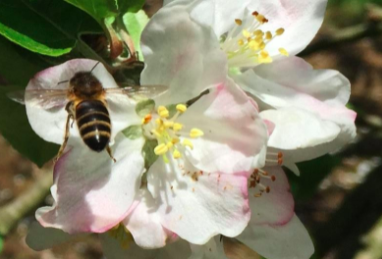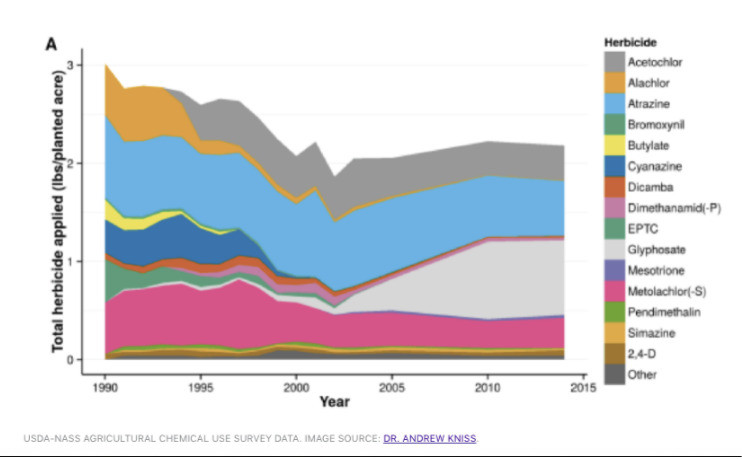Roundup is Not Just a Carcinogenic Herbicide. It’s a Bee Killing Pesticide Too.
Happy Earth Day! Please do something for the earth today. Read this article and take action below! Thank you!
A new study released April 6, 2021, in the Journal of Applied Ecology reveals that Roundup, the most widely used herbicide in the world, and the focus of recent lawsuits regarding non-Hodgkin’s Lymphoma, is not just a weedkiller but a bee killer as well.
This study is monumental because the decline of bee populations has been drastically declining since Roundup was introduced to agriculture, landscaping, and backyard gardening in the late 1970s. In the US, the number of honey-bee colonies dropped from 6 million in 1947 to just 2.5 million in 2014. In 2015, Monsanto made nearly $4.76 billion in sales and $1.9 billion in gross profits from herbicide products, mostly Roundup.
Between October 2018 and April 2019, about 40% of US honey bee colonies died, according to research from the University of Maryland. That’s the highest winter bee loss in 13 years. At this rate, they could be extinct in a few years, 1 in 4 wild bees are already at risk of extinction.
This study tested the mortality effects of spraying the world’s most popular herbicide brand (Roundup®) directly onto bumblebees Bombus terrestris audax. The label recommended pesticide concentrations were applied to the bees using a Roundup® Ready‐To‐Use spray bottle.
According to the report, the bees exhibited 94% mortality with Roundup® Ready‐To‐Use® and 30% mortality with Roundup® ProActive®, over 24 hr. Weedol® did not cause significant mortality, demonstrating that the active ingredient, glyphosate, is not the cause of the mortality. The 96% mortality caused by Roundup® No Glyphosate supports this conclusion. Dose‐dependent mortality caused by Roundup® Ready‐To‐Use, further confirms its acute toxicity. Roundup® products caused comprehensive matting of bee body hair, suggesting that surfactants, or other co‐formulants in the Roundup® products, may cause death by incapacitating the gas exchange system.
This study proves that allowing manufacturers to only submit long-term safety studies on the one declared “active” chemical ingredient (in this case, the less harmful glyphosate) in a pesticide does not allow for full assessment and accuracy in safety.
These mortality results demonstrate that Roundup® products pose a significant hazard to bees in both agricultural and urban systems and that exposure of bees to them should be limited. The authors of the study, Edward A. Straw, Edward N. Carpentier, and Mark J. F. Brown, go on to suggest that “label guidelines for all pesticides be altered to explicitly prohibit application to plants when bees are likely to be foraging on them.”
However, as bee flight and foraging patterns cannot be controlled, drift can occur for miles, and pesticides accumulate in rain and irrigation waterways, to follow this guidance, one would need to stop spraying Roundup altogether.
The authors also say, “As current regulatory topical exposure toxicity testing inadequately assesses toxicity of herbicide products, we call for pesticide companies to release the full list of ingredients for each pesticide formulation, as lack of access to this information hampers research to determine safe exposure levels for beneficial insects in agroecosystems.”
To raise awareness about the prevalence of glyphosate contamination and harm to children, nonprofit organization Moms Across America initiated the first citizen-initiated glyphosate testing in America in tap water, urine, and breast milk in 2013. The consumer group has been advocating for the ban of glyphosate herbicides for nine years, citing harm to fetuses, children, humans, animals, pollinators, wildlife, and marine life health. Director Zen Honeycutt comments on the author’s request, “We add on to this call for full disclosure of ingredients by requesting that the full formulation of all pesticides and herbicides are also regulated for safety. Current EPA approvals are based on long-term studies of only one ingredient, not the full formulation. Accurate analysis for approval would require long-term independent studies on the full and final formulations of all pesticides and herbicide products with blood analysis on both genders of adults as well as larvae or fetuses for not only toxicity but long-term harm to endocrine systems by the EPA.”
Every third bite of food humans eat requires pollination. With severe weather increasingly threatening agriculture production, advocates assert that the EPA must not allow farmers and landscapers to use unnecessary chemicals that further decrease food production by killing bees. Around the world, the movement to adopt organic regenerative farming practices is increasing and demonstrating that farming without the use of harmful agrochemicals is productive, increases water retention, raises organic matter and nutrients in the soil, decreases erosion, and reduces plant pests naturally.
A 2019 report from the Somerset Wildlife Trust in the UK found that 41% of the world’s 1 million known insect species are threatened with extinction. But claims by the manufacturers have long been made that Roundup does not harm bees. Because a significant amount of science showed that neonicotinoids harm bees, most of the advocacy focus went towards reducing the use of neonicotinoids in farming. It is clear now that Roundup also has a significant impact on bee populations.
“We can’t be sure, but in terms of numbers, we may have lost 50% or more of our insects since 1970 – it could be much more,” ecologist Dave Goulson, the author of the 2019 report.
The study raises concerns for the connection to the decline of all insects on earth and “a catastrophic collapse of the Earth’s eco-systems,” according to Goulson.
Honeycutt adds, ”The EPA must take immediate action to revoke the license of glyphosate herbicides and ensure safety for all pollinators, insects, wildlife, and human life on earth. The science shows that we simply cannot afford to allow the use of Roundup to continue. We ask the EPA to update their approval process to include extensive final formulation testing and prevent further ecological catastrophes in the future.”
TAKE ACTON
Tell the New Head of the EPA Michael Regan, and the Division of the Pesticide Re-Evaluation Director and Acting Deputy Director to revoke the license of glyphosate herbicides and enact policy change to require long term, extensive, independent safety studies with blood analysis on the FINAL and full formulation of all agrochemicals.
Click here to send a quick email and Tweet now.
Article originally posted by Zen Honeycutt of Moms Accross America.
Don’t forget to check out Food Integrity Now health store for some of your health needs. Thanks!



0 Comments